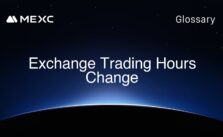Exchange
A platform or marketplace where users can trade cryptocurrencies, tokens, and digital assets with one another. Exchanges facilitate the buying and selling of cryptocurrencies and provide liquidity to the market. Different types of exchanges include centralized exchanges (CEXs) and decentralized exchanges (DEXs).
Exchange Fee
An "Exchange Fee" refers to the cost charged by a trading platform or financial exchange for each transaction made by users, which can include buying, selling, or trading assets like stocks, cryptocurrencies, or commodities. These fees can be structured as a percentage of the transaction value or as a fixed amount, varying widely among different...
Exchange Fee Schedule Update
An "Exchange Fee Schedule Update" refers to the revision or modification of the fee structure that a financial or trading platform charges for its services, such as trading, withdrawals, and other transactions. These updates are crucial for maintaining the balance between competitive pricing and the platform's profitability, ensuring that the fees align with market conditions,...
Exchange Guarantee Fund
An Exchange Guarantee Fund is a financial safety net established by trading platforms to protect investors against potential losses that may arise from counterparty defaults or the platform's operational failures. This fund acts as a form of insurance, ensuring that traders can recover their funds even if the exchange itself cannot cover the liabilities due...
Exchange Margin
Exchange Margin refers to the collateral that traders must deposit to cover potential losses on their leveraged trading positions within a financial exchange. This margin acts as a security measure to ensure that traders can fulfill their financial obligations, especially in volatile markets. Understanding Exchange Margin Exchange Margin is a critical component of leveraged trading,...
Exchange Operator
An exchange operator refers to an entity or company that manages and maintains a marketplace where securities, commodities, derivatives, or other financial instruments are traded. The operator is responsible for ensuring that the trading environment is fair, efficient, and transparent, and often also provides the technology needed for executing trades and maintaining market stability. Role...
Exchange-Traded Futures
Exchange-Traded Futures (ETFs) are standardized financial contracts traded on an exchange, obligating the buyer to purchase, and the seller to sell, a specific quantity of an asset (such as commodities, securities, or currencies) at a predetermined price on a specified future date. These instruments are used for both hedging and speculative purposes, providing participants with...
Exchange Trading Hours Change
Exchange Trading Hours Change refers to the alteration of the operational trading hours by a financial exchange. This change can affect when securities, commodities, or other financial instruments are bought and sold on the exchange. Understanding Exchange Trading Hours Change Exchange trading hours are pivotal in defining the liquidity and volatility of the assets traded....
Execution Layer
The Execution Layer, in the simplest terms, refers to a part of the blockchain architecture that is responsible for executing transactions and smart contracts. It is a critical component of the blockchain's layered structure, ensuring the seamless operation of decentralized applications (dApps) and transactions. Understanding the Execution Layer The Execution Layer is essentially the 'engine'...
Execution Venue
An execution venue is a marketplace or platform where financial instruments such as stocks, bonds, derivatives, and other securities are traded. These venues can be physical locations, like traditional stock exchanges, or electronic systems, such as online trading platforms. Examples include major stock exchanges like the New York Stock Exchange (NYSE) and the London Stock...
Explore the MEXC Blog Glossary Archive to deepen your understanding of cryptocurrency and blockchain technology. This comprehensive resource features clear, easy-to-understand definitions of key crypto-related terms, concepts, and industry jargon. Whether you’re a beginner or an experienced trader, the glossary helps you stay informed, make smarter investment decisions, and navigate the fast-evolving crypto landscape with confidence. Start learning today and boost your crypto knowledge with MEXC!



